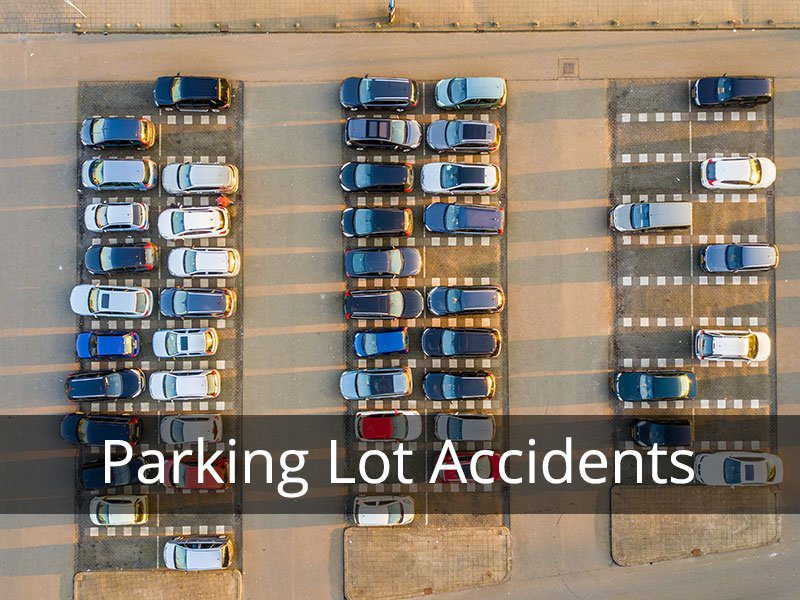Today, drivers seem to be busier and more distracted than ever.
Unfortunately, this can often be a recipe for parking lot mishaps. About one in five accidents happen in parking lots, even though nearly all of them are preventable.
If you were backing out of a parking space and got hit, the immediate question is often, “Is the person backing up always at fault?”
Other questions that arise frequently are:
- Who has the right of way in a parking lot?
- When backing out of a parking space, do you signal?
- Are parking lot accidents always 50/50?
- Do police respond to parking lot accidents?
- Do parking lot accidents go on your driving record?
Navigating these questions on your own can be tricky, depending on the state or country where you live. Compounding the issues are the laws change frequently, and across a jurisdiction.
Parking lot accident laws in Texas are different than in some other states. However, parking lot rules across the United States do have some things in common.
First, to answer the question, “When backing out of a parking space, do you signal?”
The answer is generally, it’s a good idea to use your turn signal when leaving a parked position to indicate your intent. However, the Texas Transportation Code suggests it’s not a good idea to light signals in parked vehicles as a courtesy “do pass†sign to other drivers.
Parking Lot Right of Way
Generally, when discussing the parking lot right of way rules you need to understand thoroughfares and feeder lanes.
The thoroughfares are the main arteries in parking lots, as vehicles leave or enter the streets outside the lot. Inside the parking lot, there are more numerous feeder lanes, which all end up at the thoroughfares.
Who had the right of way in a parking lot?
If you are driving on a thoroughfare, you generally have the right-of-way. Of course, you still must yield to approaching traffic, pedestrians, and cyclists. There are also parking lot signs and traffic signals to keep in mind, which also take precedence and must always be observed.
Examples include Yield or Stop signs, which are frequently placed in parking area thoroughfares to control the flow of traffic.
However, drivers on feeder lanes generally must yield to traffic on the thoroughfares. For drivers exiting a parking spot, always yield to the cars moving in the lot. It doesn’t matter if the lane is the main lane or a feeder lane. If you were backing out of a parking space and got hit, you are likely at fault for the accident.
Parking lot accident laws in Texas will more than likely find you at fault as well.
So, “Is the driver backing out always in the wrong?” In general, they tend to be, but there are exceptions.
Let’s look at some examples in the chaotic world of parking lot right of way laws and see who had the right of way in a parking lot.
Is the Person Backing Up Always at Fault?
Here’s a case where the answer to the question, “Is the person backing up always at fault” would be: not necessarily.
In cases where two drivers were simultaneously backing out of a parking space and got hit, the fault will tend to be shared between both drivers. While you might be convinced that the other driver was responsible, parking lot accident laws in Texas could find you share 50 percent responsibility.
Remember, there are exceptions. For example, what if you were almost completely pulled out from a parking spot and got struck by a driver speeding through the lot? In that case, the other driver could be found at fault.
On the other hand, if you are found more than 50 percent responsible for a parking lot collision, the proportionate responsibility statute could bar you from seeking recovery for damages.
In Texas and Arizona, “fault” state laws mean a determination of fault in simultaneous backup incidents could be murkier. Without witnesses, it can be hard to determine who was at fault when both drivers were backing up at once.
Drivers have the option to file a claim with their own insurance, the other driver’s insurance, or to file a personal injury lawsuit.
Texas’ fault state laws mean that insurance companies can end up determining fault in an accident. As a fault state, all drivers are required to carry minimum insurance coverage to pay for bodily injury and property damage claims. On the other hand, in “no-fault” states, of which there are fewer, insurers automatically cover both parties regardless of fault. This system restricts the right to sue, called the “limited tort” option.
Do Police Respond to Parking Lot Accidents?
Since parking lots are private property, there are generally not police reports to impact your driving record.
Now, that won’t stop the other driver from calling the police for a minor problem, which often happens. Of course, if there are any injuries or extensive damages, you should contact the police immediately. In all cases, the police can be very helpful and can explain how the drivers can work out the problem.
So, while parking lot accidents may not go on your driving record, a parking collision could very well impact your insurance rates.
Unfortunately, there can be long-term consequences for an often avoidable parking lot crash.
As you can see, navigating those parking lot right of way laws can be more difficult than getting through the crowded lots themselves. Therefore, it’s much wiser to follow safety rules and be cautious at all times. Even so, most people will find themselves searching for, “Who had the right of way in a parking lot?” anyway.
What Should I Do if I Was Involved in a Parking Lot Accident?
If you have the misfortune to have a parking lot mishap, treat it just like you would another traffic accident:
- Make sure the other driver is ok.
- Make sure nobody was injured.
- If the damage is extensive, or there are injuries, call the police.
- Move your car out of the way of traffic.
- Exchange insurance information.
- Get the driver’s license number.
- Get the driver’s car make and model.
- Get the driver’s contact information.
- Get any witnesses’ contact information.
- Take photos of the scene if necessary.
- Report the accident to your insurance company.
If there are injuries or substantial damages, it’s also a good idea to contact legal representation.
Easy Ways to Avoid Parking Lot Incidents
There are some easy ways to avoid running into issues in parking lots. One of the easiest is to remain alert to traffic and avoid multitasking while you drive. If you fall into the modern temptation of texting or messing with your phone, you can expect the following effects:
- Slow reaction times
- Increased stress levels
- Impaired memory formation and retention
Other than texting, common ways to be a distracted driver include eating, fixing your hair or makeup, or even daydreaming. In Texas, distracted driving is codified in law and causes a shocking 500,000 annual auto accidents.
While fatalities may not seem likely in a slowed-down parking lot, it remains more critical than ever to stay focused. In such situations, pedestrians are also highly likely to be distracted as they seek their vehicles and fellow shoppers.
Other easy ways to avoid problems in busy parking lots:
- Give drivers extra space to avoid problems due to sudden stops.
- Keep an eye out for pedestrians, especially unpredictable kids.
- Back out slowly and check your blind spots.
- Keep your brakes up-to-date and free of defects.
- Never speed in parking lots. Generally, the limit is 15 mph.
Keep in mind, the Governors Highway Safety Association cites speeding as the leading cause of fatal auto accidents in Texas. While fatalities may not be common in parking lots, the chances of injuring pedestrians are on the rise. Unfortunately, poor maintenance of parking lots leads to many avoidable pedestrian accidents.
Help for Parking Lot Accidents and Personal Injuries
As we have seen, parking lots can be dangerous places where distracted drivers and pedestrians frequently encounter problems. Modern distractions and busier traffic only make the matters worse. Sadly, accidents occur every minute in the state of Texas.
If you experience an accident or personal injury in a parking lot, you might have to file a personal injury claim. Also, it’s important to file a claim as quickly as possible. Statutory limitations mean victims may not file a claim two years past the date of an incident.
Often, it can be unclear who had the right of way in a parking lot.
If there is doubt, you can resolve the issue with help from Texas Car Accident Attorneys. The lawyers at Stoy Law Group can help you with parking lot accident laws and resolve who was at fault.
Contact us through our online form or by phone at (817) 820-0100.














